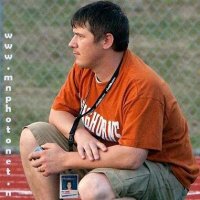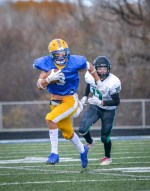Program Profile: Belle Plaine
When Justin Johnston took over as the head coach of the Belle Plaine Tigers 12 years ago, they were coming off a stretch of six total wins in four seasons. The young coach figured out early on the best chance the program had at getting back to relevance on the football field was not to force things that weren’t there.
“When you get a good hand dealt to you,” Johnston said, “try not to screw that up.”
Growing up in the football crazed town of Cavalier, North Dakota, Johnston knew what he wanted to do from an early age.
“We had a deep football tradition,” Johnston said. “When I was growing up I had a coach named Ron Oksendahl. I don’t even know how many state titles he has won.”
With about 40 kids in grades nine through 12, everyone had to play both ways – including Johnston. He played nose guard and offensive tackle on two teams that lost in the state semi-finals in both his junior and senior seasons. An injury – and his grandmother – helped Johnston deal with a hand that at the time didn’t seem to be a good one.
“I hurt my knee in the last regular season game of my senior year,” Johnston recalled. “I had a chance to play at a couple of different schools, but my grandma begged me to stop playing football. She said ‘why don’t you get into coaching instead of playing? I don’t want you getting hurt anymore.’ I ended up not playing in college, but I went the teaching and coaching route.”
Grandma was the final push, but Johnston – largely because of his former coach – was thinking about coaching football before his injury.
“The whole effect (Oksendahl) had on my life – I had a great family, so I wasn’t looking for a father figure or anything – but how much he cared about what I did struck a chord with me.”
He graduated from the University of North Dakota with a degree in Geography, but a year later Johnston went back to school at Mayville State to get his education degree.
After college, he taught and coached at Winona High School. The young coach started as the ninth grade assistant and worked his way up to varsity defensive coordinator. Wanting to become a head coach and move closer to home, the head coaching job opened up in Belle Plaine in 2005 and Johnston jumped on it.
Belle Plaine’s football program was in a tough spot. Two years before Johnston took over the Tigers’ program had to find a new head football coach just before the season began. Reluctantly the head wrestling coach at Scott West – a pared program with Jordan – Jerold Stauffacher took over. Knowing football wasn’t his area of expertise, Stauffacher told the administration he would be the acting football coach for two seasons to give the administration time to find a permeate replacement. Johnston was that replacement.
“The first thing I wanted to do was get these kids lifting,” Johnston said. “That was the time when the good teams were lifting, and the mediocre teams were just starting to figure out if we are going to compete we can do it if we get into the weight room. That was the first thing I focused on.”
Johnston’s priority area didn’t go well early on. They started with six to eight kids in the offseason weight program.
“My assistant coaches had helped out with that, and we turned that around, but it took time,” Johnston admitted. “We are a hard-working community, and kids wanted jobs in the summer. Even now we are constantly trying to convince kids that (lifting) is what is best for them. Even with the success, we have had in all our sports we still have that battle to fight.”
This past season Johnston said they had over 100 kids, 9-12, boys and girls, in the weight program.
Johnston’s first two seasons, even with some failures as the offense was in a transition period, the Tigers won a total of eight games – already an improvement.
In high school, Johnston was used to running the ball with two tight ends and three running backs, but that kind of offense was not going to work with the cards he was dealt at Belle Plaine.
“I believe you should try to match what you like about football with the kids you have,” Johnston said. “Belle Plaine is very much a basketball and baseball town. We have a lot of long, rangy athletes. To get those kinds of guys to come out for football, they are not going to want to line up and run the ball 70 times.”
Despite the fact he came from an offense that threw the ball less in an entire season than the Tigers do in one game, Johnston was intrigued by the prospects of lining up in shotgun and throwing the ball.
“I liked fast-paced football and high scoring football, and I liked throwing the ball around,” Johnston said. “I enjoyed being different. I like when people play us, a lot of times coaches will come up and comment to me and say ‘we get sick of preparing the pass.’ You don’t hear that a lot in high school football. That is obviously to our advantage because of the athletes we have. It is the philosophy of football I like, and it matches with our kids well.”
The Offense – and Team – Take Shape
The offense evolved into the wide open offense it is now.
“The first year we ran a straight I and once in a while we would drop into shotgun,” Johnston recalled. “After a few years with the kids and quarterbacks I saw coming through the system, I finally said we have to go full shotgun.”
The offense got a lift from a former state championship coach, and a former Belle Plaine player turned assistant coach.
“We met with (former Mankato West head coach) Mark Esch in 2009 because when he was down in Austin, I was the defensive coordinator in Winona. I had seen their inside zone, bubble offense. I really like it and like the decision making that could be made out of it. I talked to Mark about how they transitioned into full on shotgun.”
When former BP quarterback Charlie Kern joined the staff – after running a similar system during his time as the quarterback at Southwest Minnesota State – he helped the offense continue to expand on spread concepts. The rest of the coaching staff has evolved along with the offense.
“My first year we had four assistant coaches nine through 12,” the 12-year head coach said. “Now we have seven coaches. My defensive coordinator – Adam Smith – I think is one of the best in the business. He was the head track coach. He is leaving in March to join the Air Force National Guard at forty-years-old to go to basic training. That is the kind of guy he is. He will be joining us a week into football two-a-days. Our special team’s coach, Josh Otto, is now the head track coach. He also runs our weight room. Kern played quarterback for me from 2007-2010 – our first really successful year. Stauffacher is the head wrestling coach. The co-defensive coordinator, Pat Schultz, is the head baseball coach. We have a lot of great leadership from guys who are willing to help out and get better.”
Along with coaching experience – the staff has another trait that has helped the program’s growth.
“All my coaches are in the school,” Johnston said. “The kids get to see coaches around them.”
On the defensive side of the ball, as opposing offenses have evolved, so has the Tigers’ defense. They have switched back and forth between three-, four- and even five-men lines under Johnston. They are currently primarily a 4-3 team.
“We just try to be fundamentally sound on defense,” Johnston said. “We want our guys to win their one on one battles and get off blocks.”
On the practice field, the staff stresses fundamentals, but they keep things loose.
“I like to have fun. Sometimes if someone is being too loose at practice, chances are it is me,” Johnston admitted. “I have to make sure everyone stays focused – including myself. I want the kids to have fun first and foremost, but I want them to know there is a line between fun and work.”
The line is blurred continually around Johnston.
“I am just trying to be me. That is my personality. I like talking to people. I like trying to understand why people are thinking what they are thinking. I try to build relationships with the kids and tell them the truth about why they are or are not playing. There is the easy going side of me, but there is the brutal honesty side of me. I am going to talk to you and tell you what you need to do better if you want to play more.”
Brutal honesty does not translate into brutal practices.
“We trust that our kids are going to compete on Friday nights, so we don’t feel the need to beat them up,” Johnston said. “Because we have had lower numbers for a few years, we don’t want to have our kids sitting out because we got after them on Wednesday – that doesn’t do us any good. We stop and teach a lot.”
The teaching doesn’t stop after practice ends.
“Monday through Thursday our kids come in and eat lunch with us and watch film,” the former high school lineman said. “We split it up. One day we do defense and the next day we do offense. The kids eat lunch; we watch film and talk about the game plan.”
Johnston has been active in the feeder program since early on in his time at Belle Plaine.
“Coach Stauffacher and I have been working with the K-4 program,” Johnston said. “The kids see us down at that level. We play flag football with them on Saturdays. We have our varsity kids play with them and they start seeing football is fun. You can’t say enough good things about your kids who get beat up on a Friday night and are willing to help little kids run around for 90 minutes on a Saturday. Our ninth and tenth graders will referee or run the chains at games. We have been changing the mentality of the entire football program.”
Fifth and sixth-grade football is run by Belle Plaine’s Community Ed. The community as a whole and the parents have been instrumental in the growth of the program.
“The parents have been great,” Johnston said. “We have parents that have done things like raise money by tailgating before games. After games, the parents – either through fundraising or donation – have a meal at the school for the football players and some of the other kids that drift in from the school. We try to make it a fun, after the game hang out, so kids have something to do so they don’t go out and get into trouble.”
The program has come a long way, but Johnston knows there is a lot of work to be done.
“We need to keep encouraging our kids to get into the weight room, do our speed training in the offseason and to just get better,” Johnston said. “We have to make them understand the fun part is winning on Friday night, but you don’t win Friday night if you don’t put in the work before it. It is continually sending that message to our kids.”
Depending on the kid, Johnston and the rest of the staff take different approaches to getting kids out for football.
“We have had success with the bigger kids just talking to them and getting them to just try it out,” Johnston explained. “The basketball players, we ask them to come to seven on seven. If you hate it, don’t come the next week. If you like it, come the next week. Come to team camp, and you will get to know more about what Friday night is like. I never hold it against a kid if they say no. I just want him to give it a chance. If it is not your cup of tea, I am not going to be mad at you.”
No one in Belle Plaine is mad about the direction of the football program. Johnston feels the program is close.
“We are right there. We are not going to make the state playoffs every year, but that is the goal.”
Carsen Ladd returns at the quarterback spot. Marcus Walsh will be coming back from injuries, but Johnston said he could be the best running back he has ever coached. Jack Stauffacher has a wrestler’s mentality and is a leader at a linebacker spot.
“We have had great kids,” Johnston said. “If you have kids who are willing to work for you that have some talent and you can get more talent out of him. That is what a coach should do – extract a little more talent out of a talented kid. That is why we have turned it around. It is because of the kids we have had and the commitment they had to get better.”
Johnston and his staff still play with the cards they are dealt, but now the difference is, they are dealt better cards than when they were struggling to win two games a season. Over time the Tigers have effectively stacked the deck and most of the time, have held the winning hand.


















